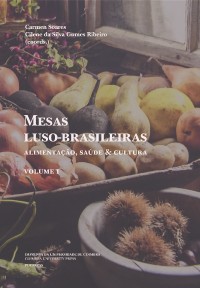Please use this identifier to cite or link to this item:
https://hdl.handle.net/10316.2/45232| DC Field | Value | Language |
|---|---|---|
| dc.contributor.author | Algranti, Leila Mezan | |
| dc.date.accessioned | 2019-01-28T15:42:21Z | |
| dc.date.accessioned | 2020-09-04T21:50:08Z | - |
| dc.date.available | 2019-01-28T15:42:21Z | |
| dc.date.available | 2020-09-04T21:50:08Z | - |
| dc.date.issued | 2018-01 | - |
| dc.identifier.isbn | 978-989-26-1718-3 | |
| dc.identifier.isbn | 978-989-26-1721-3 (PDF) | |
| dc.identifier.issn | 2183-6523 | |
| dc.identifier.uri | https://hdl.handle.net/10316.2/45232 | - |
| dc.description.abstract | During the Portuguese colonization in America, there was an intense and continuous exchange of knowledge and dietary practices between those coming from Europe and the local populations. Preservation of the health of the settlers and their bodily care demanded employment of natural resources, such as plants and seeds, for alimentary and therapeutic purposes, which depended on an accurate knowledge of their properties. Often, the same plants served both purposes. Taking as a point of departure colonial treatises on the art of healing, this paper explores the close relationship between health and nutrition in the everyday life in the Captaincy of Minas Gerais. It aims at understanding how Portuguese apothecaries made use in their prescriptions of ordinary food products (corn, cassava, sugar cane brandy | eng |
| dc.description.abstract | Ao longo da colonização portuguesa na América, o intercâmbio de saberes e práticas alimentares entre os adventícios e as populações locais foi intenso e contínuo. Os cuidados com o corpo e a preservação da saúde demandaram dos colonos a exploração dos recursos naturais, tais como o conhecimento de plantas e sementes para a produção de alimentos e a confecção de medicamentos. Muitas vezes as mesmas plantas serviam à culinária e a fins terapêuticos. Com base em tratados sobre a arte de curar, o presente estudo explora as estreitas relações entre saúde e alimentação no cotidiano da capitania de Minas Gerais. Interessa especialmente compreender como os práticos portugueses incorporaram a seus saberes curativos o uso medicinal de produtos coloniais consagrados na culinária local e presentes nas refeições diárias, como o milho, a mandioca, a aguardente de cana. | por |
| dc.language.iso | por | - |
| dc.publisher | Imprensa da Universidade de Coimbra | por |
| dc.relation.ispartof | http://hdl.handle.net/10316.2/45206 | por |
| dc.rights | open access | - |
| dc.subject | nutrition | eng |
| dc.subject | cooking | eng |
| dc.subject | domestic pharmacy | eng |
| dc.subject | health | eng |
| dc.subject | cultural exchanges | eng |
| dc.subject | alimentação | por |
| dc.subject | culinária | por |
| dc.subject | saúde | por |
| dc.subject | botica doméstica | por |
| dc.subject | intercâmbio cultural | por |
| dc.title | A Botica Colonial: apontamentos sobre saúde e alimentação na América Portuguesa (Minas Gerais - século XVIII) | por |
| dc.title.alternative | The domestic pharmacy in Portuguese America: some notes on food and health (Minas Gerais XVIII century) | eng |
| dc.type | bookPart | por |
| uc.publication.firstPage | 123 | - |
| uc.publication.lastPage | 143 | - |
| uc.publication.location | Coimbra | por |
| dc.identifier.doi | 10.14195/978-989-26-1721-3_5 | - |
| uc.publication.digCollection | PB | por |
| uc.publication.orderno | 5 | - |
| uc.publication.area | Artes e Humanidades | por |
| uc.publication.bookTitle | Mesas luso-brasileiras: alimentação, saúde & cultura. vol. I | - |
| uc.publication.manifest | https://dl.uc.pt/json/iiif/10316.2/45232/200576/manifest?manifest=/json/iiif/10316.2/45232/200576/manifest | - |
| uc.publication.thumbnail | https://dl.uc.pt/retrieve/11010619 | - |
| uc.publication.parentItemId | 55086 | - |
| uc.itemId | 68120 | - |
| item.grantfulltext | open | - |
| item.fulltext | With Fulltext | - |
| Appears in Collections: | Mesas luso-brasileiras: alimentação, saúde & cultura. vol. I | |
Files in This Item:
| File | Description | Size | Format | |
|---|---|---|---|---|
| a_botica_colonial.pdf | 1.28 MB | Adobe PDF |  |
Items in DSpace are protected by copyright, with all rights reserved, unless otherwise indicated.
